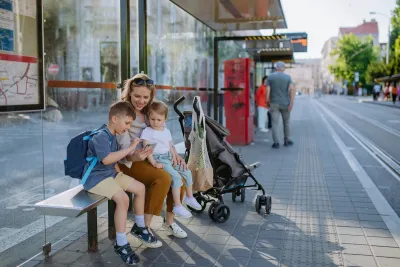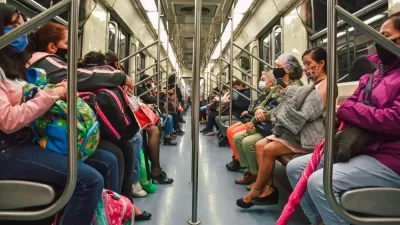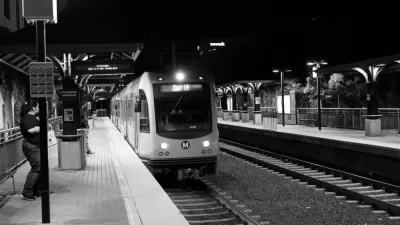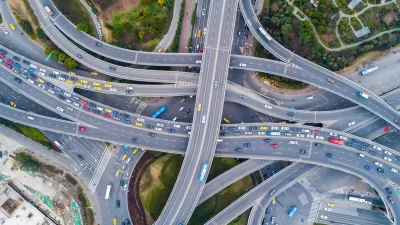‘Mobility hubs’ aim to make urban travel easier by connecting travel modes. Adding more services could make them more accessible and useful to women and families.

“The ‘mobility hub’ — or a central location where travelers can connect with multiple shared modes — is a buzzy transportation planning concept that's been inspiring articles and studies for years,” writes Kea Wilson in Streetsblog USA.
But do these trendy sites effectively serve women and caregivers? According to a Swedish and American research team, there is no concrete evidence of how these spaces support these groups, and workshops and surveys with women who use transit hubs revealed “a universe of invisible needs” that go largely unaddressed.
It is common knowledge that women tend to make shorter and more frequent “chained” trips; “They also perform a raft of invisible labors that aren't reflected on typical travel surveys, which tend to focus on destinations, distances, and time spent in transit, rather than the underlying reasons why people move — and the largely uncompensated work they need to perform along the way.”
The researchers found that women surveyed would benefit from services at mobility hubs such as playgrounds next to bus stops to occupy children or free WiFi so they can communicate or attend to errands while waiting for a bus or train. “If designers think creatively, mobility hubs can help alleviate the burden of other forms of unseen labor, too, like helping caregivers perform the ‘labor of hosting’ by popping up a holiday market stall on the sidewalk right next to the bikeshare stand, saving them a lengthy trip to buy gifts.”
FULL STORY: Do Women and Caregivers Need More From The ‘Mobility Hub’?

Trump Administration Could Effectively End Housing Voucher Program
Federal officials are eyeing major cuts to the Section 8 program that helps millions of low-income households pay rent.

Planetizen Federal Action Tracker
A weekly monitor of how Trump’s orders and actions are impacting planners and planning in America.

Ken Jennings Launches Transit Web Series
The Jeopardy champ wants you to ride public transit.

Rebuilding Smarter: How LA County Is Guiding Fire-Ravaged Communities Toward Resilience
Los Angeles County is leading a coordinated effort to help fire-impacted communities rebuild with resilience by providing recovery resources, promoting fire-wise design, and aligning reconstruction with broader sustainability and climate goals.

When Borders Blur: Regional Collaboration in Action
As regional challenges outgrow city boundaries, “When Borders Blur” explores how cross-jurisdictional collaboration can drive smarter, more resilient urban planning, sharing real-world lessons from thriving partnerships across North America.

Philadelphia Is Expanding its Network of Roundabouts
Roundabouts are widely shown to decrease traffic speed, reduce congestion, and improve efficiency.
Urban Design for Planners 1: Software Tools
This six-course series explores essential urban design concepts using open source software and equips planners with the tools they need to participate fully in the urban design process.
Planning for Universal Design
Learn the tools for implementing Universal Design in planning regulations.
Ada County Highway District
Clanton & Associates, Inc.
Jessamine County Fiscal Court
Institute for Housing and Urban Development Studies (IHS)
City of Grandview
Harvard GSD Executive Education
Toledo-Lucas County Plan Commissions
Salt Lake City
NYU Wagner Graduate School of Public Service





























